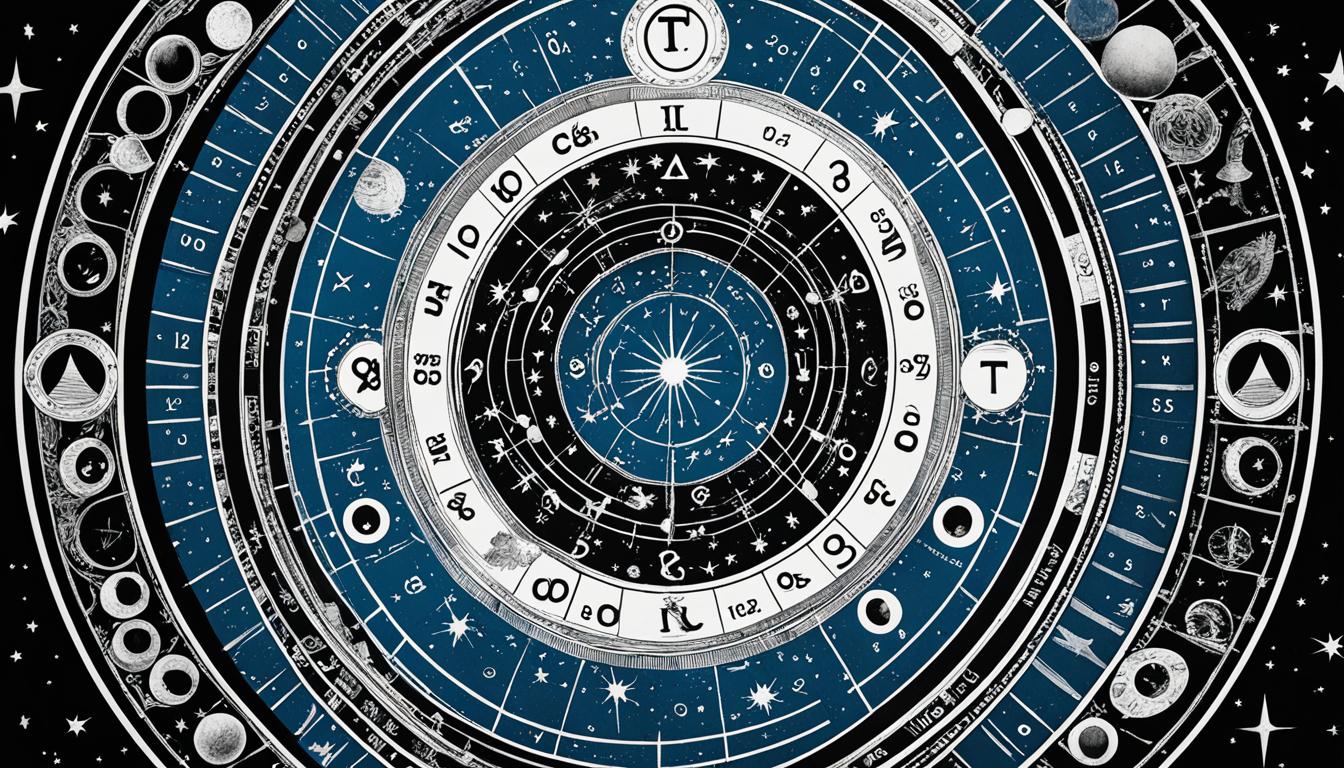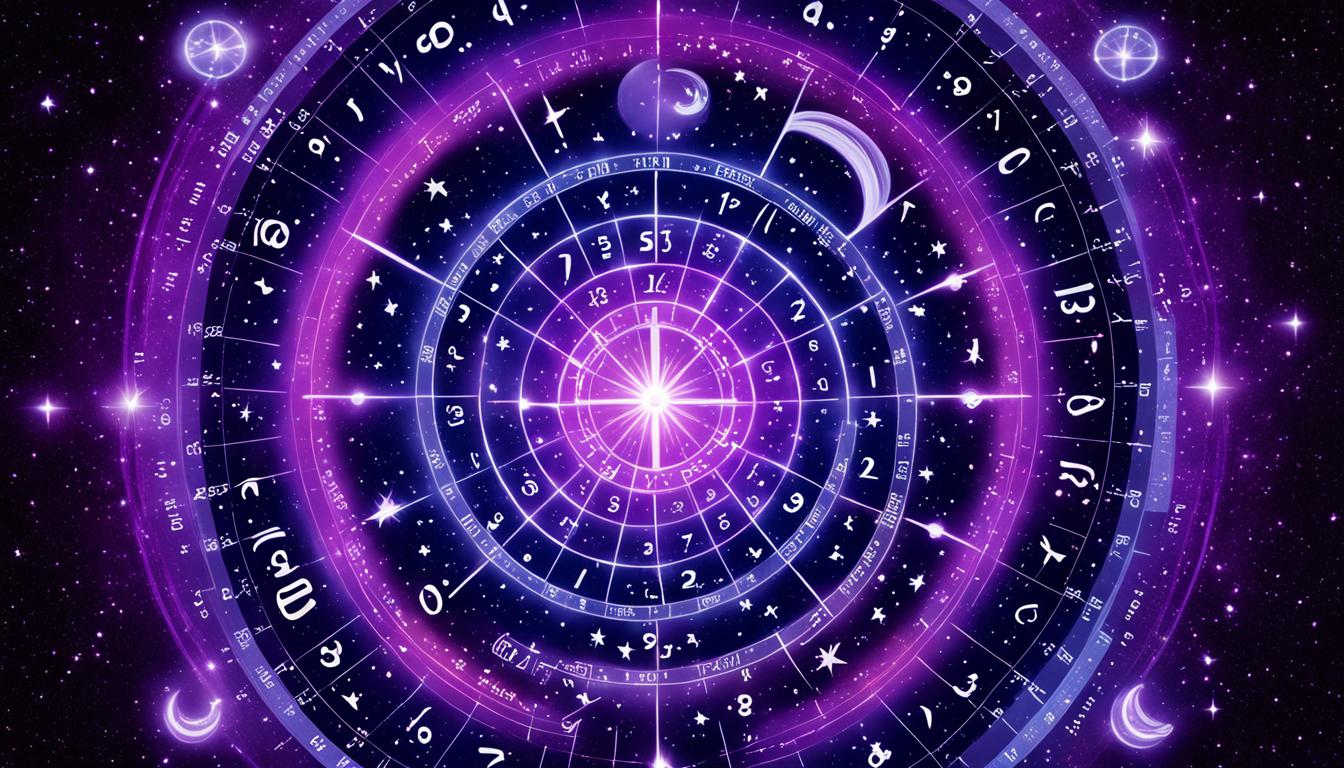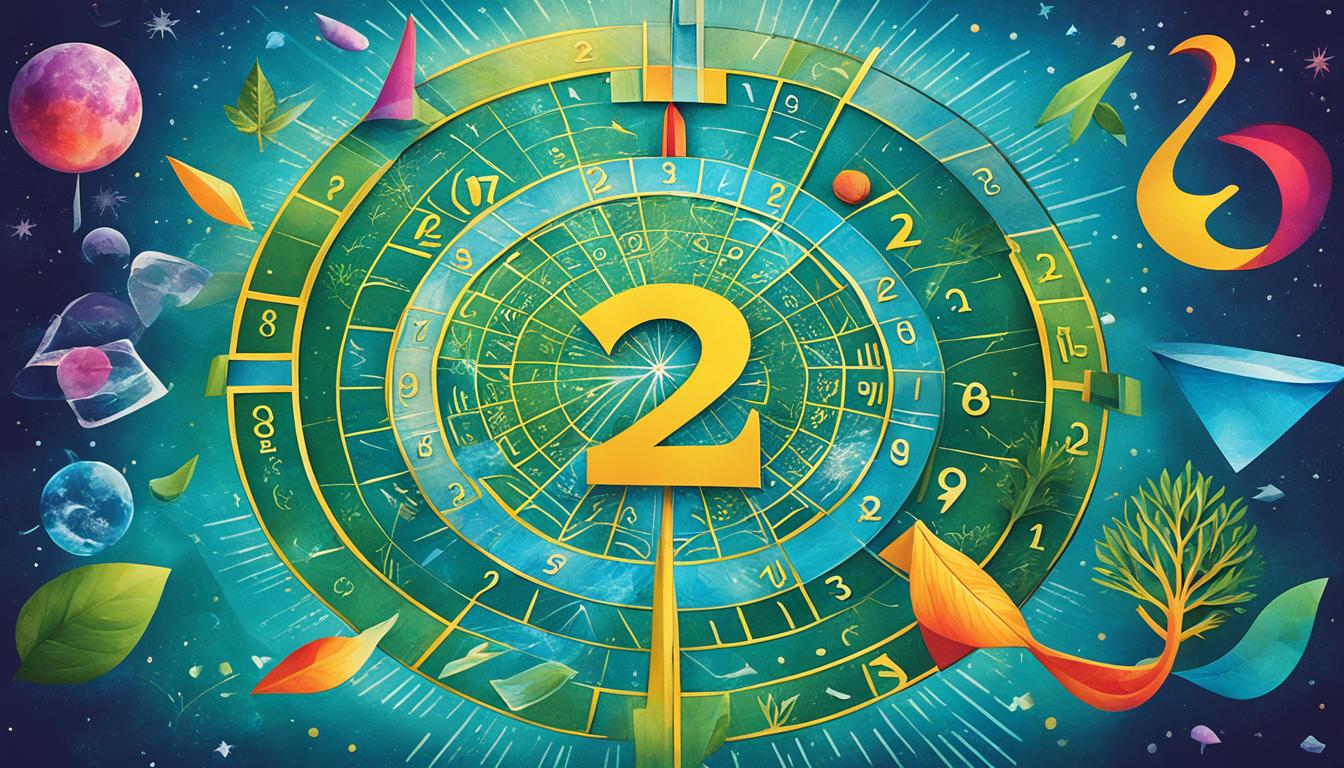Have you ever wondered where numerology comes from? I know I have! In this article, we’ll explore the fascinating origins and history of numerology, from its ancient roots to its modern-day interpretations and practices.
Numerology is an age-old practice that has been traced back to numerous ancient civilizations, including Egypt, Greece, China, and India. It is a system of divination that uses numbers and their mystical properties to gain insight into various aspects of an individual’s life, including personality traits, life purpose, and relationships.
So, where is numerology derived from, exactly? Let’s find out!
Key Takeaways:
- Numerology is an ancient practice that has been used by numerous civilizations throughout history.
- It is a system of divination that uses numbers and their mystical properties to gain insight into various aspects of an individual’s life.
- Numerology has a rich and fascinating history that spans over thousands of years.
Ancient Origins of Numerology
Numerology, the practice of assigning significance to numbers, has been a part of various cultures throughout history. It is believed to have originated in ancient times and has since been practiced and studied by scholars and mystics alike. In this section, we will explore the ancient origins of numerology and how it was practiced in different civilizations throughout history.
The Roots of Numerology
The origins of numerology can be traced back to ancient civilizations, where numbers were considered to hold spiritual significance and were used in divination practices. The ancient Egyptians, Greeks, Chinese, and Indians all had their own unique systems for assigning meaning to numbers.
The Egyptians, for instance, used numerology in their architecture and hieroglyphics, believing that numbers held magical properties. They also used numerology in their religious rituals, such as in the Book of the Dead, which contained instructions for the afterlife.
Numerology in Ancient Greece
The Greeks were also fascinated by numerology and believed that numbers represented fundamental principles of the universe. Pythagoras, the famous philosopher and mathematician, believed that numbers were the building blocks of the cosmos, and that everything in the universe could be understood through numerical principles.
Pythagoras is credited with developing Pythagorean numerology, which assigns numerical values to the letters of the alphabet and uses these values to interpret the meaning of words and names. This system is still widely used in numerology today.
Numerology in Ancient China
Numerology also played a significant role in Chinese culture, where it was closely intertwined with astrology and divination practices. The Chinese believed that certain numbers were lucky or unlucky, and that these numbers could influence a person’s life and destiny.
For example, the number 8 is considered lucky in Chinese culture because it sounds similar to the word for “prosperity” or “wealth.” On the other hand, the number 4 is considered unlucky because it sounds similar to the word for “death.”
Numerology in Ancient India
Perhaps the most well-known system of numerology is Indian numerology, which is deeply rooted in Vedic scriptures and spiritual practices. In India, numerology is called “jyotish,” which means “science of light.”
Indian numerology is based on the idea that each number corresponds to a specific energy or vibration, and that these energies can be used to gain insights into a person’s personality, life purpose, and destiny. Indian numerology is still widely practiced in India and has gained popularity around the world.
In conclusion, numerology has a rich and fascinating history that spans across cultures and civilizations. Its enduring popularity is a testament to the enduring fascination with the power of numbers and their ability to provide insights into the mysteries of the universe.
Numerology in Ancient Egypt
The practice of numerology in ancient Egypt was deeply intertwined with their religious and spiritual beliefs. The ancient Egyptians believed that numbers held powerful symbolic meanings and were often used in rituals, architecture, and even everyday life.
| Number | Symbolic Meaning |
|---|---|
| 3 | Representation of the three main gods: Osiris, Isis, and Horus |
| 7 | Representation of the seven celestial bodies visible to the naked eye |
| 12 | Representation of the 12 months of the year |
These symbolic meanings were used in various aspects of ancient Egyptian life, including the construction of their pyramids and the decoration of their tombs. In fact, the layout of the Great Pyramid of Giza is said to have been determined by numerological calculations based on the dimensions of the structure.
“Numerology played a significant role in the ancient Egyptian belief system, and its use can be seen in many aspects of their culture and traditions,” said Dr. Zahi Hawass, an Egyptian archaeologist and former Minister of Antiquities.
It was believed that each individual had a unique destiny that could be determined by their birth date and name. Numerologists in ancient Egypt would use these factors to calculate a person’s “life number” and provide insight into their character and future.
The practice of numerology in ancient Egypt continues to fascinate scholars and spiritual practitioners alike, showcasing the enduring significance of this ancient art in our modern world.
Numerology in Ancient Greece
As I mentioned earlier, numerology also had a significant presence in ancient Greece. Pythagoras, a Greek philosopher and mathematician, is often credited with developing the Pythagorean system of numerology, which is still widely used today.
Pythagoras believed that numbers held mystical properties and that each number had its own unique vibration and energy. He taught that by understanding the symbolism of numbers, one could gain insight into the nature of the universe and the human experience.
The Pythagorean system assigns a numerical value to each letter of the alphabet and uses these values to calculate various aspects of a person’s life, such as their life path number and destiny number. It is also used to analyze the vibrations of words and names, with the belief that the energy of a person’s name can influence their life experiences.
Numerology in Ancient China
Chinese culture has a long and rich tradition of numerology that dates back to ancient times. Numerology was an essential component of Chinese astrology and was used extensively in divination practices.
The Chinese believed that numbers held significant energy and vibration, which could have a powerful impact on a person’s life. This belief led to the development of various numerology systems, including the Ba Zi system, which assigns a specific value to each digit in a person’s birth date and time to create a unique profile of their character and destiny.
| Key Concepts in Chinese Numerology | Meaning |
|---|---|
| Yin and Yang Numbers | Odd numbers are considered Yang, while even numbers are considered Yin. This belief is based on the concept of balance between opposing forces. |
| Five Elements | The five elements (Wood, Fire, Earth, Metal, and Water) are associated with specific numbers and are used to determine a person’s character and destiny. |
| Four Pillars of Destiny | This system, also known as Ba Zi, is used to create a unique profile of a person’s character and destiny based on their birth date and time. Each pillar represents a different aspect of a person’s life. |
Chinese numerology has also influenced other areas of Chinese culture, including art, architecture, and feng shui. The number eight, for example, is considered lucky in China because it sounds similar to the word for “prosperity,” while the number four is associated with bad luck because it sounds similar to the word for “death.”
Today, Chinese numerology continues to be widely practiced and is an integral part of Chinese culture and spirituality.
Numerology in Ancient India
As a professional copywriting journalist, I find the tradition of numerology in ancient India to be one of the most rich and fascinating in the world. Numerology is deeply rooted in Vedic scriptures and spiritual practices, where it is used to provide insights into one’s personality, life path, and relationships.
In ancient India, numerology was known as “Arithmancy,” and was taught in the same schools as other mystical practices such as astrology and palmistry. Numerology played a significant role in determining the ideal time for important life events such as weddings or starting a new business. It was believed that by aligning oneself with the right numbers, one could achieve greater success and prosperity.
| Influential Vedic scholars in Numerology | Significant contributions |
|---|---|
| Brahmagupta | Credited with devising the modern numerical system and making important advances in algebra. |
| Aryabhata | Developed the concept of zero and made groundbreaking contributions to trigonometry and astronomy. |
The study of numerology in India continues to this day, with many people consulting with numerologists to gain deeper insight into their lives and make important decisions. In fact, many Indian businesses and political leaders still consult with numerologists to ensure success and prosperity.
The use of numerology in India has also influenced the practice of numerology in other parts of the world. Today, many of the numerology practices and concepts we use in the West have their roots in ancient India.
Overall, the rich tradition of numerology in ancient India continues to have a lasting impact on the practice of numerology around the world. As a copywriting journalist, I find it fascinating to learn about the numerous ways in which numerology has been used throughout history to better understand ourselves and the world around us.
Numerology in Modern Times
Today, numerology has become a popular practice for those seeking spiritual guidance and personal insight. As a result, it has been integrated into various self-help and holistic movements, including astrology, tarot, and yoga.
Many people use numerology to gain a deeper understanding of themselves and their life path. One of the most widely used practices is the calculation of life path numbers, which can reveal an individual’s strengths, weaknesses, and life purpose based on their birthdate.
Personal year cycles are also a popular interpretation in modern numerology, indicating the energy and themes surrounding an individual during a given year. This can be a useful tool for understanding the challenges and opportunities that lie ahead.
While some people may be skeptical of numerology’s validity, others find it to be a helpful tool for gaining self-awareness and personal growth. Incorporating numerology into daily life can provide insights into personality traits, relationships, and the pursuit of one’s life purpose.
The Influence of Pythagoras
One of the most significant contributors to the development of numerology was Pythagoras, the ancient Greek philosopher and mathematician. Pythagoras, who believed that everything in the universe could be explained through numbers, developed the Pythagorean numerology system. This system assigned numerical values to the letters of the alphabet and used them to analyze personality traits and predict future events.
Pythagoras believed that each number had its own unique vibration and energy, and that by understanding the properties of numbers, we could gain insights into the fundamental nature of the universe. He taught that numbers were the building blocks of reality, and that by understanding them, we could better understand ourselves and the world around us.
Pythagoras’s teachings on numerology have had a lasting impact on the field, and many modern numerologists still use his theories and techniques to analyze and interpret numbers. His ideas have also influenced other areas of study, including mathematics, philosophy, and spirituality.
Numerology Today: Popular Practices and Interpretations
Today, numerology has gained widespread popularity as a tool for gaining insight into various aspects of our lives. From personality assessment to life path analysis, numerology offers a unique perspective on understanding ourselves and the world around us.
One of the most popular practices of numerology is calculating one’s Life Path Number, which is based on the individual’s birthdate and is said to reveal their life purpose and potential. Another widely used method is the Personal Year cycle, which provides insight into the themes and opportunities that may arise in a given year.
Numerology has also been integrated into various self-help and personal growth movements. For example, some believe that certain numbers hold particular energetic frequencies and can be used to manifest specific outcomes or qualities in one’s life.
Interpretations in numerology can vary widely, but certain numbers are generally seen as holding significant meanings. For example, the number 11 is often associated with spiritual intuition and cosmic connection, while the number 7 is said to represent wisdom and introspection.
Ultimately, the power of numerology lies in its ability to provide insight and guidance on our journey of self-discovery and personal growth. By understanding the underlying principles and practices of numerology, we can tap into the wisdom of the universe and unlock our true potential.
Numerology and Personal Growth
Numerology is more than just a tool for divination and self-discovery – it can also be a powerful aid for personal growth and self-awareness. By exploring the significant numbers and patterns in our lives, we can gain insights into our personality traits, life purpose, and relationships.
One of the main ways numerology can support personal growth is through the concept of life path numbers. By calculating the numerological value of our birth date, we can determine our life path number and gain a deeper understanding of our inherent strengths and weaknesses. This knowledge can be used to make better life choices that are in harmony with our true purpose and values.
Another area where numerology can be helpful for personal growth is in analyzing personal year cycles. This concept is based on the idea that our lives unfold in nine-year cycles, each with its unique set of challenges and opportunities. By understanding the numerological influences of our current personal year, we can gain insight into what lies ahead and prepare accordingly.
In addition to these specific applications of numerology, simply becoming more attuned to the presence and significance of numbers in our daily lives can be a powerful tool for personal growth. By noticing patterns and synchronicities, we can develop a deeper appreciation for the interconnectedness of all things and gain a greater sense of meaning and purpose in our lives.
Overall, numerology is a fascinating and multifaceted practice with a wide range of potential applications for personal growth and self-awareness. Whether you’re just starting to explore the world of numerology or have been practicing for years, there is always more to discover and learn.
Numerology and Personal Growth
As a professional copywriting journalist, I have explored the fascinating world of numerology and its ancient origins, as well as its use in modern times. However, numerology is not just about predicting the future or uncovering hidden meanings in numbers. It can also be a powerful tool for personal growth and self-awareness.
The Benefits of Numerology for Personal Growth
Numerology can provide valuable insights into our personality traits, life purpose, and relationships. By understanding the vibrations and energy of our life path number, we can gain a deeper understanding of our strengths and weaknesses.
Furthermore, numerology can be an effective tool for identifying our personal year cycles. Knowing which cycle we are currently in can help us navigate the challenges and opportunities that lie ahead, and make informed decisions about our personal and professional growth.
Incorporating Numerology into Self-Awareness Practices
There are several ways to incorporate numerology into self-awareness practices. For example, we can meditate on our life path number and its meaning, or reflect on the lessons and themes of our personal year cycle.
We can also use numerology to gain insights into our relationships. By understanding the energy and compatibility of our life path numbers with others, we can build stronger and more harmonious connections.
Conclusion
Overall, numerology can be a powerful tool for personal growth and self-awareness. By exploring the ancient origins and modern applications of numerology, we can gain a deeper understanding of ourselves and the world around us. So why not give it a try and see what insights numerology has to offer?
FAQ
Q: Where is Numerology Derived From? Uncovering Origins & History
A: Numerology is derived from ancient civilizations and has a rich history that spans across cultures and time periods.
Q: What are the ancient origins of numerology?
A: Numerology has its roots in ancient cultures such as Egypt, Greece, China, and India, where it was used for various purposes.
Q: How was numerology practiced in ancient Egypt?
A: Numerology played a significant role in ancient Egyptian culture, influencing their belief systems and practices.
Q: What is the connection between numerology and ancient Greece?
A: Numerology was an integral part of ancient Greek philosophy and was closely linked to the teachings of famous philosophers and mathematicians.
Q: How was numerology used in ancient China?
A: Numerology had a strong presence in ancient Chinese culture and was closely tied to their astrology and divination systems.
Q: What is the significance of numerology in ancient India?
A: Numerology has deep roots in ancient Indian traditions, particularly in Vedic scriptures and spiritual practices.
Q: How has numerology evolved in modern times?
A: Numerology has experienced a resurgence in modern times and has been integrated into various spiritual and self-help movements.
Q: What was the influence of Pythagoras on numerology?
A: Pythagoras made significant contributions to the development of numerology and emphasized the mystical properties of numbers.
Q: What are some popular practices and interpretations of numerology today?
A: Today, numerology is widely practiced, with popular interpretations focusing on life path numbers, personal year cycles, and more.
Q: How can numerology contribute to personal growth and self-awareness?
A: Numerology can provide valuable insights into personality traits, life purpose, and relationships, making it a useful tool for personal growth.



